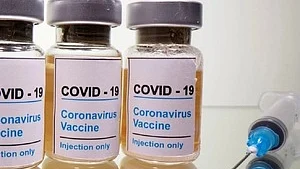State-owned vaccine manufacturers sit idle as India scours for jabs: Report
While SII and Bharat Biotech, both private firms, struggle to meet India’s domestic requirement besides international obligations, the government is giving no job to seven public sector firms

Presently, two private Indian vaccine manufacturers-- Serum Institute of India (SII) and Bharat Biotech -- are struggling to meet India’s domestic demand of 90 million doses every month besides their other contractual obligations. But they are producing about 70 million doses per month, which is considerably below the required quantity.
Shocking as it may be, the Narendra Modi government did not consider any of its own institutes for manufacturing Covid-19 vaccines, an investigative report by Down To Earth (DTE) magazine reveals.
These include the Central Research Institute (CRI) in Himachal Pradesh; BCG Vaccine Laboratory (BCGVL), Pasteur Institute of India (PII) and HLL Biotech in Tamil Nadu; Bharat Immunologicals and Biologicals Corporation Limited, Uttar Pradesh; Haffkine Bio-Pharmaceutical Corporation Limited, Maharashtra; and Human Biologicals Institute, Telangana. The state-of-the-art Integrated Vaccine Complex based in Chengalpattu, Tamil Nadu has also been lying idle since its inauguration in 2016, says the report.
It is clear by now that vaccination is the only way to combat the highly contagious coronavirus. And it is here that India is falling behind. There is crunch of vaccines across the country as Covid infections and deaths climb at maddening pace. Till the first week of April this year, India has managed to fully immunise barely 0.9 per cent of its adult population with double doses of the vaccine; another 12.7 million people have received a single dose. Reports of vaccine shortages have emerged from across the country including Odisha, Gujarat, Rajasthan and Maharashtra among others.
However, India has disbanded its public sector vaccine manufacturers to make way for private players, finds the DTE investigation. While in a belated move, on April 16, 2021 the government announced a plan to include three PSUs in the vaccine-making process, three major vaccine manufacturing units under the Ministry of Health and Family Welfare, which have the maximum expertise and capacity to produce vaccines, have not been included in this list, the report reveals. Even the Integrated Vaccine Complex was not included.
The report says that on March 17, Maharashtra’s Chief Minister Uddhav Thackeray had specifically asked Prime Minister Narendra Modi during a video-conferencing to allow the transfer of Covaxin technology to state-owned Haffkine Institute in Mumbai. The Centre has not yet given a go-ahead.
Before the Covid-19 pandemic, India was the world leader in vaccine production. But presently, China and USA are manufacturing more Covid-19 vaccines than India.
The DTE report suggests that India’s public sector needs a second chance. Government needs to put money into the public sector to ramp up their infrastructure and vaccine production. Nations the world over are realising that profit-driven private players might not be enough during the unprecedented crisis, the report says.
“In India, the public sector should be revived to its full capacity with adequate support to strengthen its inherent strengths on expertise and skilled human resource,” Y. Madhavi, researcher at the Council of Scientific and Industrial Research–National Institute of Science, Technology And Development Studies, is quoted as saying.
The report also questions the government’s decision to identify only one company (Bharat Biotech) for technology transfer. “Involving more companies in manufacturing could have averted the shortage,” says Vibha Varshney, the lead investigator and writer of the magazine’s report.
The three-part investigation also finds that most of the vaccines for the novel coronavirus disease through March 2021 were manufactured in China, followed by the United States, India, the European Union and the United Kingdom. Amongst them the US and UK have kept all their vaccines for domestic consumption. EU countries are sharing within themselves.
India and China are the only countries exporting almost half of their vaccines to other nations, mostly those in the developing and underdeveloped world.
Follow us on: Facebook, Twitter, Google News, Instagram
Join our official telegram channel (@nationalherald) and stay updated with the latest headlines